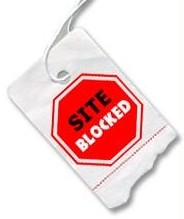Facebook Under Fire for Temporarily Blocking Pages in Pakistan
 By DECLAN WALSH and SALMAN MASOOD
By DECLAN WALSH and SALMAN MASOOD
 Facebook said on Friday that it had blocked users in Pakistan from access to the pages of a popular Pakistani rock band and several left-wing political pages, drawing sharp criticism from free-speech activists who accused the American company of caving in to government censors.
Members of the band, Laal, whose members have frequently spoken out against the Taliban, confirmed that their Facebook page, which had over 400,000 “likes,” had been blocked.
Following an outcry on social media and inquiries by reporters to the Pakistani government and to Facebook, the government reversed itself and Facebook restored access to Laal’s page.
Facebook said on Friday that it had blocked users in Pakistan from access to the pages of a popular Pakistani rock band and several left-wing political pages, drawing sharp criticism from free-speech activists who accused the American company of caving in to government censors.
Members of the band, Laal, whose members have frequently spoken out against the Taliban, confirmed that their Facebook page, which had over 400,000 “likes,” had been blocked.
Following an outcry on social media and inquiries by reporters to the Pakistani government and to Facebook, the government reversed itself and Facebook restored access to Laal’s page.
But advocates said late on Friday that at least six other Facebook pages that promoted progressive debate in Pakistan and that had been blocked during the week remained inaccessible.
“Facebook claims to be in favor of free speech, and talks about protecting political expression, but they are not,” said Shahzad Ahmad of the group Bytes for All Pakistan, which campaigns for Internet freedom and has gone to court several times seeking to lift government restrictions in Pakistan."For the sake of their own profits and business, they are caving in to anything the government demands.”
A spokeswoman for Facebook in London said the company’s policy was to adhere to local laws, and that it blocked the pages after receiving an official request from the Pakistan Telecommunications Authority, which regulates Internet content in Pakistan.
“While we never remove this type of content from the site entirely, like most Internet services, we may restrict people from accessing it in the countries where it is determined to be illegal,” the spokeswoman said, adding that questions about why specific pages were blocked were “best addressed to the authorities who issue these orders.”
The spokeswoman declined to be named, citing company policy.
Facebook was banned entirely in Pakistan for several months in 2010, during a controversy over a page that encouraged people to draw cartoons of the Prophet Muhammad.
The company says it regularly weeds out pages that promote hate or extremism. According to a report published on its website, Facebook restricted access to 162 pieces of content in Pakistan between July and December 2013, and many more in some other countries, including India, where it restricted access to more than 4,700 pages in the same period.
But activists said on Friday that the latest blocks in Pakistan affected pages that spoke out against extremism, while several extremist pages in the country were left untouched.
“This is ridiculous,” said Taimur Rahman, the lead singer of Laal, speaking before the ban on his group’s page was lifted. “None of our content could be construed as anti-state or anti-religious, in any shape or form.”
The Facebook actions come at a time when freedom of speech is under increasing pressure in Pakistan. Extremists have been bringing criminal accusations of blasphemy against journalists, and the army has been cracking down on criticism of itself in the media. The government media regulator suspended broadcasts of the country’s most popular news channel, Geo News, on Friday and fined it $104,000, on accusations that Geo News had defamed the military’s Inter-Services Intelligence spy agency.
Ale Natiq, 31, the administrator of the Urdu-language page Roshni Pakistan, speculated that the military was behind the blocking of the page this week. “We’re not anti-state or anti-religion,” Mr. Natiq said. “But we’ve been very vocal on the Baluchistan issue, which is sensitive to the military, so that might have done it.”
Several activists questioned why Facebook had not blocked other Pakistani pages that incite sectarian violence, religious extremism or hatred against minorities. As examples, they pointed to pages administrated by supporters of Ahle Sunnat Wal Jamaat, a notorious sectarian groups that has supported attacks on Shiites; the sectarian militant group Lashkar e Jhangvi;and the Red Mosque, where a violent stand-off between extremists and government forces in 2007 left over 100 people dead, and where a recently opened library is named for Osama bin Laden.
“These pro-Taliban pages are spewing hatred, and we are the people they shut down,” said Mr. Rahman, the singer. “It’s insanity.”
Facebook officials say that they resist censorship as much as possible, but their leverage is limited in countries like Pakistan where the government imposes constraints with little public debate.
 By DECLAN WALSH and SALMAN MASOOD
By DECLAN WALSH and SALMAN MASOOD
Facebook said on Friday that it had blocked users in Pakistan from access to the pages of a popular Pakistani rock band and several left-wing political pages, drawing sharp criticism from free-speech activists who accused the American company of caving in to government censors. Members of the band, Laal, whose members have frequently spoken out against the Taliban, confirmed that their Facebook page, which had over 400,000 “likes,” had been blocked. Following an outcry on social media and inquiries by reporters to the Pakistani government and to Facebook, the government reversed itself and Facebook restored access to Laal’s page.
No comments:
Post a Comment